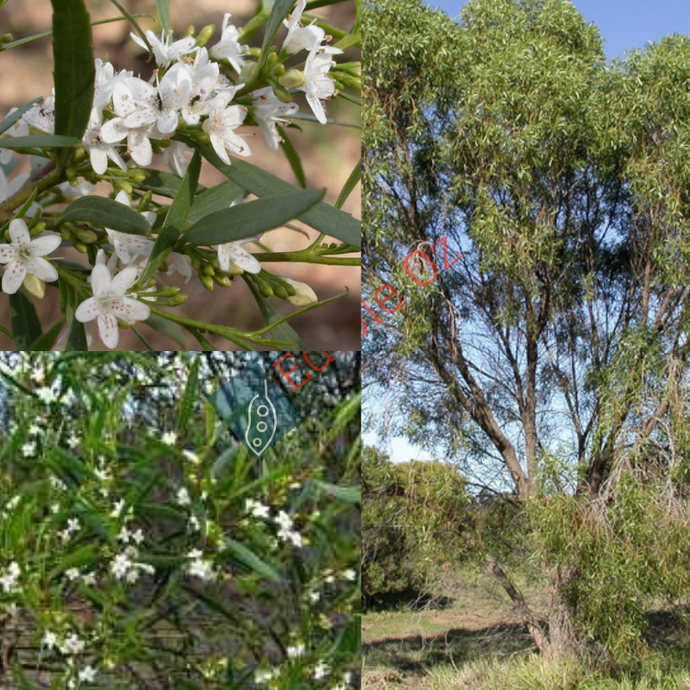
Sugarwood / False Sandalwood - Myoporum platycarpum (Ngural) seeds
Regular price
$3.95
Sale
or make 4 interest-free payments of
$0.98 fortnightly with
 More info
More info
Myoporum platycarpum - False Sandalwood (Sugarwood)
A hardy and long-lived shrub or small tree with sweet, fragrant qualities and versatile uses for bush food, medicine, and timber.
Quick Facts
- Height & Spread: Grows as a large shrub or small tree with a drooping canopy.
- Flowers: Small, fragrant, white tubular blooms from August to November.
- Fruits: Green and fleshy when young, drying as they mature.
- Soil: Thrives in a variety of soil types, especially alkaline sand to loam.
- Position: Prefers full sun and cannot tolerate shade.
- Climate: Extremely hardy and frost-tolerant, suitable for dry and semi-arid regions.
Why Grow Myoporum platycarpum?
False Sandalwood is an excellent choice for dry regions, offering shade, shelter, and screening while producing fragrant flowers and sweet manna. Its durable wood and historical significance as a bush food and medicine plant make it a valuable addition to native gardens and restoration projects.
Bush Food Note
False Sandalwood offers several edible products:
-
Fruits:
- Can be eaten raw or cooked, but caution is advised as some members of the genus contain liver toxins.
- Consume in moderation and ensure proper identification.
-
Manna:
- A sugary exudate from the bark, highly regarded as a local delicacy.
- Often eaten raw or used as a natural sweetener.
Bush Medicine Note
- Traditional Uses: The plant’s exudate (manna) has been traditionally used as a laxative.
- Caution: Potential toxicity in large quantities; consult a professional for medicinal use.
Disclaimer: Information about traditional bush medicine is provided for educational purposes only. Always consult a healthcare professional before use
How to Grow
-
Sowing Instructions:
- Sow seeds in well-drained soil in a sunny location.
- Cover seeds lightly with soil or sand to prevent displacement.
-
Position:
- Plant in full sun for optimal growth.
- Suitable for dry or moist soils but ensure they are not waterlogged.
-
Care Tips:
- Prune lightly to maintain shape and size.
- Water regularly during establishment; drought-tolerant once mature.
- Mulch around the base to retain moisture and suppress weeds.
Uses in Your Garden
- Bush Food Garden: Produces sweet manna and edible fruits (with caution).
- Ornamental Value: Fragrant flowers and drooping foliage add character to landscapes.
- Shelter & Shade: Provides excellent cover and shade in dry areas.
- Timber Use: Wood is valuable for veneers, cabinet making, and other crafts.
Cultural and Practical Notes
- Toxicity: While no specific records of toxicity exist for this species, fruits of some related species in the genus are known to contain liver toxins.
- Adhesive Use: Manna from the stems can also be used as a natural adhesive.
Order Now
Grow the hardy and versatile Myoporum platycarpum in your garden or restoration project. With its sweet manna, fragrant flowers, and practical uses, False Sandalwood is a timeless addition to dry and arid landscapes.
Order your False Sandalwood seeds today and cultivate a plant of cultural and ecological significance!
